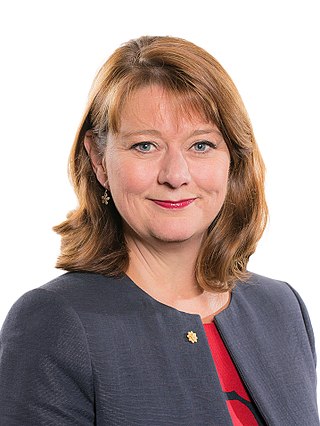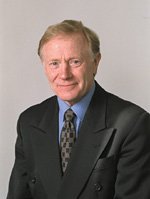Plaid Cymru is a centre-left to left-wing, Welsh nationalist political party in Wales, committed to Welsh independence from the United Kingdom. It campaigns on a platform of social democracy and civic nationalism. The party is a supporter of the European Union and is a member of the European Free Alliance (EFA). The party holds 4 of 32 Welsh seats in the UK Parliament, 12 of 60 seats in the Senedd, and 202 of 1,231 principal local authority councillors. Plaid was formed in 1925 under the name Plaid Genedlaethol Cymru and Gwynfor Evans won the first Westminster seat for the party at the 1966 Carmarthen by-election.

Dafydd Wynne Wigley, Baron Wigley, is a Welsh politician who served as the leader of Plaid Cymru from 1981 to 1984 and again from 1991 to 2000. He served as the Member of Parliament (MP) for Caernarfon from 1974 to 2001 and as the Member of the Welsh Assembly for Caernarfon from 1999 to 2003. In 2010, Wigley was granted life peerage, taking his seat in the House of Lords in 2011.

Dafydd Elis Elis-Thomas, Baron Elis-Thomas,, is a Welsh politician who served as the leader of Plaid Cymru from 1984 to 1991 and represented the Dwyfor Meirionnydd constituency in the Senedd from 1999 to 2021.

Gwynfor Richard Evans was a Welsh politician, lawyer and author. He was President of the Welsh political party Plaid Cymru for thirty-six years and was the first member of Parliament to represent it at Westminster, which he did twice, from 1966 to 1970, and again from 1974 to 1979.

Goronwy Owen Goronwy-Roberts, Baron Goronwy-Roberts,, was a Welsh Labour member of Parliament.

Leanne Wood is a Welsh politician who served as the leader of Plaid Cymru from March 2012 to September 2018, and served as a Member of the Senedd (MS) from 2003 to 2021.

Welsh independence is the political movement advocating for Wales to become a sovereign state, independent from the United Kingdom.

Owen John Thomas was a Welsh Plaid Cymru politician who was a Member of the Welsh Assembly (AM) for the South Wales Central region from 1999 to 2007.

Plaid Cymru originated in 1925 after a meeting held at that year's National Eisteddfod in Pwllheli, Caernarfonshire. Representatives from two Welsh nationalist groups founded the previous year, Byddin Ymreolwyr Cymru and Y Mudiad Cymreig, agreed to meet and discuss the need for a "Welsh party". The party was founded as Plaid Genedlaethol Cymru, the National Party of Wales, and attracted members from the left, right and centre of the political spectrum, including both monarchists and republicans. Its principal aims include the promotion of the Welsh language and the political independence of the Welsh nation.
The 1962 Montgomeryshire by-election was a parliamentary by-election held on 15 May 1962 for the British House of Commons constituency of Montgomeryshire.
The 1943 University of Wales by-election was a parliamentary by-election held in the United Kingdom between 25 and 29 January 1943 for the House of Commons constituency of University of Wales.
The Welsh Shadow Cabinet is formed from members of the official opposition in the Senedd, the largest party not part of the Welsh Government, to scrutinise ministers in the Welsh Cabinet. It is led by the Leader of the Opposition, who typically appoints members of the Senedd (MSs) from their party as shadow ministers with portfolios which mirror ministerial posts in the Cabinet who scrutinise ministers and can propose their own alternative policies. Other opposition parties in the Senedd also appoint frontbench teams of spokespeople who perform the same function. These are also sometimes styled as "shadow cabinets" by their parties, though unlike the Shadow Cabinet they have no official recognition. Since 2021, the Shadow Cabinet has been formed from members of the Welsh Conservatives led by Andrew RT Davies, who have alternated with Plaid Cymru as the official opposition in the Senedd since its establishment as the National Assembly for Wales in 1999.

The 2000 Plaid Cymru leadership election was held following the resignation on health grounds of Dafydd Wigley.

The 2003 Plaid Cymru leadership election was held following the resignation of Ieuan Wyn Jones after a disappointing showing in the 2003 Assembly elections where the party fell from 17 to 12 seats.

The 2018 election for the leader of the Welsh political party Plaid Cymru began on 7 August. Voting closed at midnight on 27 September. Adam Price was declared the winner on 28 September, defeating the two other candidates.

In the Senedd, the Leader of the Opposition is the leader of the Official Opposition, the largest political party that is not in the Welsh Government. The Leader of the Opposition leads and appoints members of the Shadow Cabinet and as such is sometimes styled as the Shadow First Minister of Wales.
The 1984 Plaid Cymru presidential election was held following the resignation of Dafydd Wigley, who had led the party since 1981, on the grounds of his caring commitments linked to his children's health conditions.
The 1991 Plaid Cymru presidential election was held following the resignation of Dafydd Elis Thomas, who had led the party since 1984 after his announcement that he would stand down as an MP at the 1992 general election.

Dafydd Wigley became Leader of the Opposition and Shadow First Secretary of Wales after the creation of the National Assembly for Wales on 12 May 1999, following the first assembly election held on 6 May. Members of his shadow cabinet were elected by Plaid Cymru's assembly members and announced on 18 May.

Ieuan Wyn Jones became Leader of the Opposition in Wales after being elected as President of Plaid Cymru, the Official Opposition in the National Assembly for Wales, on 3 August 2000. Jones had previously served in these roles in an acting capacity on the behalf of his predecessor Dafydd Wigley from December 1999 to February 2000. He formed his shadow cabinet on 9 August and, like his predecessor, appointed himself Shadow First Secretary of Wales and Shadow Assembly Secretary for Finance. Members of his shadow cabinet were initially known as shadow assembly secretaries until October 2000. From that month, members were known as shadow ministers, with Jones's titles also changing to Shadow First Minister of Wales and Shadow Minister for Finance, after a similar change was made to the names of ministerial posts in Rhodri Morgan's coalition government between Labour and the Liberal Democrats. Jones's shadow cabinet was dissolved after the formation of a coalition government between Plaid Cymru and Morgan's Labour Party on 19 July 2007.














